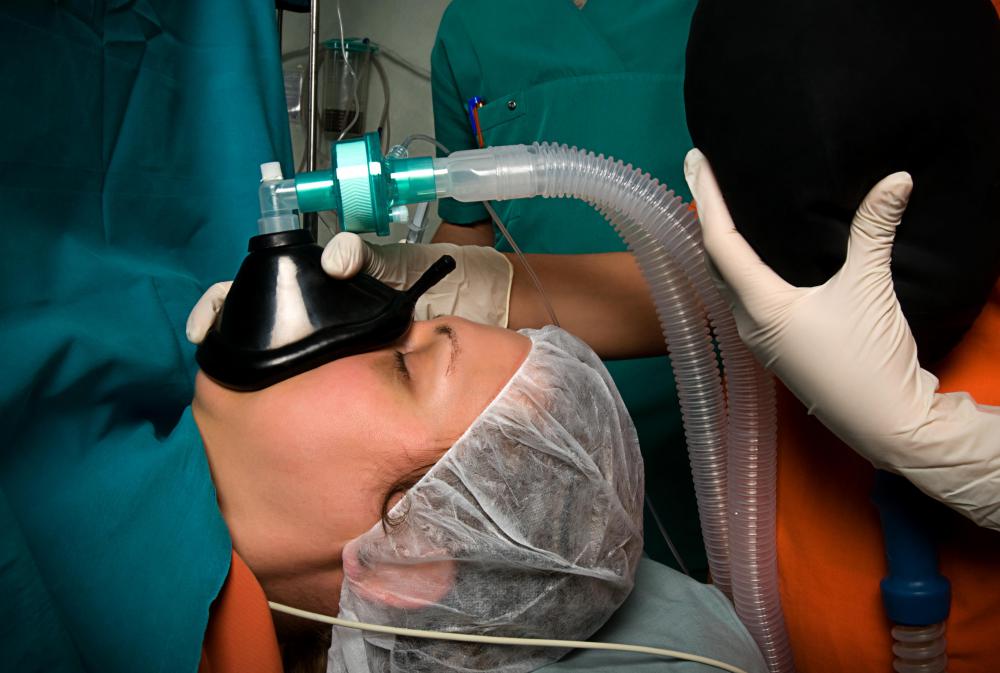At TheHealthBoard, we're committed to delivering accurate, trustworthy information. Our expert-authored content is rigorously fact-checked and sourced from credible authorities. Discover how we uphold the highest standards in providing you with reliable knowledge.
What is Sinus Surgery?
Sinus surgery is surgery performed on the sinuses, either to correct physical defects or to address chronic sinusitis. This surgery is typically performed under general anesthesia by a maxillofacial surgeon or otolaryngologist, otherwise known as an Ear, Nose, and Throat (ENT) surgeon. The procedure generally takes several hours, and it is followed with several days of healing time during which the patient may experience some discomfort.
Classically, sinus surgery is performed because the patient keeps having sinus infections, and none of the techniques used to manage sinus infections are working for the patient. The doctor may use medical imaging studies to look inside the sinus cavities, assessing the patient's situation and looking for things which could be corrected with surgery. If the sinuses are heavily inflamed with damaged tissue or they look like they are not draining properly, sinus surgery can help resolve the patient's chronic sinus problems.

During the surgery, instruments are inserted either through the mouth or the nose. The surgeon trims away inflamed and diseased tissue, and widens the drainage openings to allow the sinus cavities to drain more fully. In some cases, the surgery may actually reroute the sinuses so that they will drain more effectively. Then, the surgeon packs the area with dressing to absorb the body fluids which will drain from the surgical site, and the patient is brought out of anesthesia.

Bleeding and pain in the first few days after surgery are normal. While the patient can often go home on the day of the surgery, it will be necessary to go back to the doctor's office so that the packs can be changed and the progress of the healing can be monitored. In the first few days, the patient must avoid any source of strain. Eventually, the packs can be removed, and the patient can start on a course of nasal irrigation to keep the sinuses clean and healthy.

Long term care after sinus surgery includes regular nasal irrigation and techniques which are designed to keep the sinuses lubricated to reduce the risk of infection and promote drainage. Patients need to follow directions carefully to make sure that their sinuses heal properly, as fail to comply can result in infections and other complications.
Sinus surgery will not work for everyone. Patients should discuss the risks and benefits of the surgery along with their specific case with the surgeon before consenting to the procedure.
AS FEATURED ON:
AS FEATURED ON:
















Discussion Comments
@burcinc-- Complications are possible with every kind of surgery. My sinus surgery was very successful and I have not had any problems. I don't get infections anymore and I can actually breathe.
I have chronic sinus infections. I've been on antibiotics so many times and I have had my sinuses drained too. The infection always comes back. My doctor wants me to have sinus surgery but I'm not sure. Having my sinuses cut out sounds scary and I think I'm going to resist this idea until I absolutely have no other choice.
By the way, can there be sinus surgery complications? Does recovery take long? Will it lead to other problems in the long-term?
@anon312496-- I have the same exact problem post my sinus surgery. There is constantly a foul smell in my nose, it's very disturbing.
I saw my doctor about it this morning and he said that this is common after sinus infection surgery. He put me on a course of antibiotics just in case. I've been told to continue flushing my nose to keep the sinuses clean.
You need to tell your doctor this because it might be an infection. If it's not, it will probably go away on its own but you need to keep flushing.
I'm hoping that the smell will go away by the time I finish my antibiotics. It's so gross!
I would like to know why there is constantly a smell in my nasal passages.
Post your comments